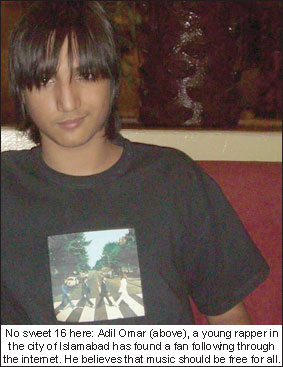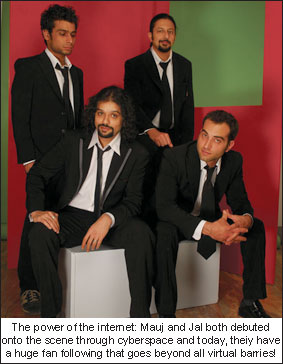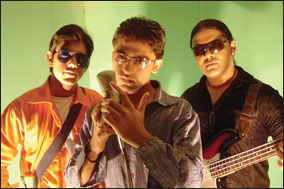|
|
| |
capital
talk
Rapping in the capital
With the explosion of internet and social websites like Orkut
and MySpace, artists have found an easy outlet of marketing themselves.
Adil Omar, a young rapper in Islamabad captures an audience through
this medium. Instep takes an inside look behind this phenomenon…
By Maria
Tirmizi
|
| |
The
federal city of Islamabad is lately taking on various diverse roles.
It has played a dignified host to visiting heads of state at stately
receptions. It has welcomed and bid farewell to a stream of venerated
ambassadors. At the same time, it has attempted to cook up a bit of
fun through CDA-generated festivals, giving the youth out here a respectable
outlet for creative expression. And then there's been a bit of the
following too:
"Pull the trigger, disconnect your head from your body
Kill your team with a chainsaw, for my comfort
Cut you up, eat your face-off - I'm repulsive
Roar like a lion, I'm morbid and violent
My reign is around, so the storm isn't silent
If I tell you I'm normal, I'm lying
I'm gougin' eyes out, you [bleep] [bleep], you a blind [bleep]..." |
 |
| |
One
of the few of his lyrics that could be used with minimal 'bleeps',
they have been written and recorded by a hardcore rapper of Islamabad
who seems to have acquired a considerable US and European fan base
online through his MySpace and SoundClick presence.
Adil Omar is not yet 16. Yet, he has been able to zoom his music off
straight to free music downloaders around the world, with around 20
to 50 downloads from his webpage everyday, signifying an increasing
trend of youngsters snubbing unreachable major record labels and reining
in the power of the Internet to reach as many people as possible through
their free music. |
| |
Using the web
for promotion is nothing new for struggling artists. Lilly Allen,
the 22-year-old British singer/songwriter, rose to fame through her
MySpace presence and the Arctic Monkeys gave out free online demos
to fans, which worked wonders for them. Our own underground solo artists
and bands have gained recognition after putting up their music on
the Internet and promoting it on websites like Orkut. Jal is the prime
example of a band hitting it big by cutting across orthodox lines
when its song 'Aadat' stirred up a storm on the Internet, propelling
ferocious downloading. Similar was the case with Mauj, who released
their debut single, 'Khushfehmi' via internet. These artists, initially
calling themselves underground, aimed at going commercial someday,
preferably on their own terms, but some also retaining a certain degree
of flexibility with respect to their identity according to the dictates
of the commercial market.
Then there are the real underground artists who prefer remaining outsiders
to the mainstream music scene because they want extreme creative freedom.
Their aim is to gather like-minded fans even if it makes them |
 |
| remain
a cult phenomenon, but not compromising on the extreme eccentricity
and wackiness of their underground music. Adil Omar, who describes
his music as "horrorcore, obscene, dark, extreme, angry and violent",
different from mainstream rap for which he has contempt, calling it
too "commercialized and materialistic," is one such artist
right here in the federal capital. |
| |
"I
don't blabber about money and clubs like the rappers today do. I stick
to keeping most of my music raw and dirty," says Adil.
But now, another incredible phenomenon is in the making. Due to rampant
illegal and some legal downloads of free music, the trends of the
music industry have shifted so drastically, that even acclaimed artists
in the west are realizing out of necessity rather than principle that
music should be given out for free on the Internet. Due to this realization,
an established Indie band (short for independent; artists not signed
with any major recording label and thus outside the mainstream music
scene) called The Crimea, has made a revolutionary move by giving
out its second, self-financed album of 11 tracks, 'Secrets of the
Witching Hour', for download entirely for free, hoping to generate
money later on from tours, merchandising and licensing deals. Instead
of crying about digital piracy and the subsequent drop in album sales,
they are initiating what some are predicting to be a "music revolution."
|
| |
Adil Omar says,"
I believe in giving out music for free. I don't think people should
have to pay for good music all the time. I'd prefer to make money
off selling merchandise, doing collaborations, and touring instead."
Once he reaches the acclaimed status that is.
The experiment of making money from tours instead of album sales after
gaining recognition through the all-powerful Internet is a pipe dream
in Pakistan, because firstly, not everyone has access to digital music,
and secondly, it would only work for highly established acts, not
real underground artists like Adil Omar.
|
 |
| |
Sarmad
Ghafoor, a well-known music producer and guitarist, feels that a
lack of intermediaries out here has resulted in a situation in which
underground bands with considerable fan following haven't been able
to arrange a respectable number of gigs. He gives the example of
the band Mizraab, of which he is a huge fan, and which has numerous
fans in Islamabad as well. Yet, it hasn't had a single gig here
because there are no event managers who focus specifically on unsigned
bands. Most concerts are either corporate concerts or heavily corporate-sponsored
concerts which aim for an audience of 50,000 rather than 1000, even
though a cult market is still a market, with a potential of its
own, he says.
Adil Omar has been writing since he was ten and has recorded up
to a 100 songs in a studio he set up himself.
"I rap about everything you see in Wes Craven and Tarantino
films. Death, destruction, brutality, and horror. I'm an entertainer.
I aim to shock. I aim to offend. And it's a healthy way to express
emotions rather than acting it out," he says.
His most famous raps, generating the most downloads, are 'Stomped
& Defeated', 'Eradicate' and 'Retaliation'. He has even worked
with a few famous rappers such as Twiztid and The Insane Clown Posse,
"primarily known for their public feud with Eminem a few years
ago", says Adil.
"A person in their management approached me and my rap-friend
B-Leave. He asked us to spit verses on an unreleased project of
theirs which they might put out in the future, so he emailed us
the song and we sent it back after we recorded it. We're in touch
on and off."
He says his fans, within the age group of 13 and 25 are mostly outside
Pakistan, and are either into death metal, which has the same content
as his music, or underground rap, which he distinguishes from mainstream
rap by linking the former with skill and creativity and the latter
with marketability.
What is surprising is that he gets inspiration from rock bands like
Marilyn Manson and the Nine Inch Nails and even plans to set up
his own rock/metal/rap band when he completes his education. Most
people who are heavily into rap seem to have extreme contempt for
rock.
Rizwan Chaudhary, a 20-year-old American citizen, who was born and
bred in Brooklyn, New York, and is currently studying in Pakistan,
is heavily into rap, and demonstrates just that.
"I bang with rap cuz it's the best way to express how I feel.
The rap game is all about being on top and destroy any niggaz career
whose tryin' to limit your digits. Its either you on top or get
knocked," explains Rizwan with a heavy 'gangsta' accent.
"As far as rock goes, I don't wanna hear that sh-- around me,"
he adds with a chuckle.
But Adil feels that good music is good music, and he finds it highly
stupid when rappers cannot seem to admire anything good if it isn't
hip hop.
What is a future like for an angry rapper also into hardcore rock?
In his own words, not anywhere near Pakistan.
He feels his music has no scope here, and despite all the hard work
he puts in, it will never be taken seriously. Consequently, he has
plans of flying off to the States and forming his own indie label
because there is a huge demand for his kind of music out there.
And there are other aspirations too. "I see myself in the field
of media and entertainment, releasing my own albums, making films,
being single and enjoying myself, touring with a band, signing young
talent, writing and selling hit pop tracks to singers who can't
write their own stuff, probably acting too," he says.
Though Adil Omar has lived in Islamabad all his life, he has successfully
formed a cult association, courtesy the Internet, with like-minded
musicians and fans from all over the world, who only listen to his
raw, explicit material with glee, rendering his nationality and
ethnicity totally irrelevant. He will use this gained recognition
when he tries to set something up in the States after he finishes
his education.
The internet seems to have changed the rules of the game for musicians,
to the extent of making established bands in the West like The Crimea
take the first leap of acknowledgment. It remains to be seen if
and when such an acknowledgement will reach Pakistan and how it
will hit our developing music industry.
|
| |
|

